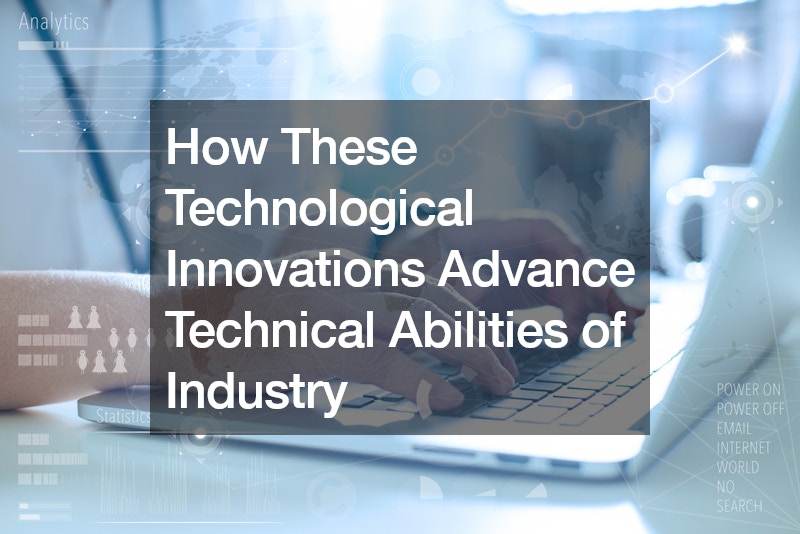Technology has become an integral part of our everyday lives, transforming industries, enhancing efficiency, and creating new possibilities. The continuous advancements in technology reflect the relentless human endeavor to push boundaries and innovate. In this article, we will explore various cutting-edge technologies that are revolutionizing sectors such as automotive, hospitality, construction, landscaping, restaurants, moving services, and more. These technologies not only embody the pinnacle of human ingenuity but also illustrate the immense potential and wide-ranging impact of technological progress. By examining these advancements, we can better understand how they are shaping our world today and what future horizons they can open.
Cloud Computing

Cloud computing is the backbone of many modern technological advancements, including automotive point of sale software. By leveraging cloud services, automotive dealerships can manage sales, inventory, and customer relationships more efficiently. The flexibility and scalability of cloud computing allow these businesses to adapt quickly to market changes and customer demands.
Another significant impact of cloud computing is in the realm of data storage and analysis. Companies can store vast amounts of data in the cloud and utilize advanced technical tools to analyze it, providing deeper insights and better decision-making capabilities. This shift towards data-driven strategies has proven to be a game-changer for many enterprises.
Moreover, cloud computing supports collaborative work environments by allowing real-time data sharing and communication. This is particularly beneficial in sectors that require coordination among various stakeholders. Overall, the integration of cloud computing in different industries signifies a significant leap towards advanced technical efficiencies and operational excellence.
One of the notable benefits of cloud computing is the enhancement of cybersecurity measures. Cloud service providers offer robust security protocols, including encryption, multi-factor authentication, and continuous monitoring, which protect sensitive business data from cyber threats. This level of security is particularly crucial for industries handling large volumes of personal and financial information, such as healthcare and finance.
In addition to security, cloud computing facilitates disaster recovery and business continuity. Traditional on-premise systems are vulnerable to data loss due to hardware failures or natural disasters. Cloud-based solutions, however, offer automated backups and remote data storage, ensuring that businesses can quickly recover and resume operations with minimal downtime.
Cloud computing also drives innovation by enabling access to cutting-edge technologies such as artificial intelligence (AI), machine learning (ML), and the Internet of Things (IoT). Businesses can integrate these technologies into their operations without the need for significant upfront investment. For instance, AI and ML algorithms can process large datasets in the cloud to predict trends, optimize processes, and personalize customer experiences.
Furthermore, the cost-effectiveness of cloud computing cannot be overstated. By eliminating the need for extensive hardware infrastructure and reducing maintenance costs, businesses can allocate resources to other critical areas such as research and development. The pay-as-you-go model offered by many cloud providers allows companies to scale their services based on demand, ensuring optimal resource utilization. Finally, the global reach of cloud computing enables businesses to expand their operations across different regions effortlessly. Cloud services can be accessed from anywhere with an internet connection, facilitating international collaborations and allowing companies to tap into new markets without the limitations of physical infrastructure.
Smart Mowing Technology
Smart mowing technology combines the best of artificial intelligence and robotics to offer superior lawn maintenance solutions. A typical mower package deal now includes advanced technical features such as boundary sensors, autonomous operation, and weather adaptability. These innovations ensure that the lawn is maintained perfectly with minimal human intervention.
Autonomous mowers are designed to navigate complex lawn layouts, avoiding obstacles and adjusting their mowing patterns for optimal coverage. This capability is particularly valuable for landscaping businesses and homeowners who seek efficiency and precision in lawn care. The integration of intelligent sensors also means that the mower can operate in various weather conditions without compromising performance.
Furthermore, smart mowing technology minimizes environmental impact by optimizing fuel consumption and reducing waste. These eco-friendly solutions are gaining popularity as more people become conscious of sustainability. The convenience of controlling these mowers through smartphone apps adds another layer of user-friendliness, allowing real-time adjustments and monitoring from anywhere. In summary, the fusion of robotics and AI in mowing technology represents another step towards advanced technical progress in landscaping.
Digital Key Systems
Digital key systems have transformed how we access and secure properties, particularly in the hospitality industry. The best hotels now offer digital key options that provide guests with the convenience of accessing their rooms via smartphones. This seamless experience enhances guest satisfaction and operational efficiency.
Modern digital key systems leverage advanced technical features such as encryption and authentication to ensure security. These keys can be managed remotely, allowing property managers to grant or revoke access instantly. This level of control is invaluable for maintaining security and ensuring only authorized individuals can access restricted areas.
Additionally, the integration of digital keys with other smart building systems, such as lighting and HVAC, creates a more interconnected and responsive environment. This interconnectedness enables the automation of various functions, thereby streamlining operations and improving energy efficiency. Furthermore, digital key systems reduce the need for physical keycards, contributing to sustainability efforts by minimizing plastic waste. Guests can also receive personalized experiences through digital key systems, such as customized room settings and services based on their preferences. The advent of digital key systems marks a significant advancement in property management and security.
Self-Healing Concrete

The development of self-healing concrete represents a groundbreaking advancement in construction technology. Unlike traditional concrete, this innovative material has the capability to repair its own cracks, significantly extending its lifespan. Concrete contractors are increasingly adopting this technology to enhance the durability of infrastructure projects.
Self-healing concrete incorporates microcapsules filled with healing agents that activate when cracks form. This advanced technical solution helps to maintain structural integrity and reduces the need for frequent repairs. As a result, it offers substantial cost savings over the long term by minimizing maintenance expenses.
Moreover, the use of self-healing concrete contributes to sustainability by reducing waste and resource consumption. This eco-friendly technology aligns with the growing emphasis on sustainable building practices. In conclusion, self-healing concrete is a remarkable innovation that addresses both economic and environmental concerns in construction.
Kitchen Display Systems
Kitchen display systems (KDS) are revolutionizing the restaurant industry by streamlining order management and improving kitchen efficiency. For seafood restaurants and other dining establishments, KDS provides a digital interface that displays orders and cooking instructions in real time. This minimizes errors and ensures the timely preparation of dishes.
These systems are embedded with advanced technical functionalities such as touchscreen interfaces, order prioritization, and integration with point-of-sale systems. This seamless interaction between front-of-house and back-of-house operations enhances communication and reduces the likelihood of mistakes. Consequently, it leads to higher customer satisfaction and better operational efficiency.
Moreover, KDS enables better data tracking and analysis. Restaurants can monitor preparation times, identify bottlenecks, and make informed adjustments to their processes. This data-driven approach supports continuous improvement and operational excellence. The adoption of kitchen display systems represents a significant step forward in the culinary industry.
Virtual Assistants
Virtual assistants have become indispensable tools for managing various tasks efficiently, both in personal and professional settings. Moving services, for instance, can benefit immensely from virtual assistants that help coordinate schedules, track shipments, and handle customer inquiries. This enhances the overall customer experience and operational workflow.
These AI-powered assistants utilize advanced technical algorithms to understand and execute user commands. They can manage calendars, send reminders, and perform a range of automated tasks. This level of automation allows businesses to focus on core activities while the virtual assistant handles routine tasks.
Moreover, virtual assistants are continually improving through machine learning, becoming more adept at understanding context and user preferences. This continuous improvement ensures they remain valuable tools for enhancing productivity and efficiency. The widespread adoption of virtual assistants underscores their role in the modern technological landscape.
GPS

The global positioning system (GPS) is fundamental to numerous applications, particularly in navigation and logistics. For businesses like a 24 hour towing service, GPS technology is indispensable for locating stranded vehicles quickly and providing timely assistance. This enhances customer satisfaction and operational efficiency.
GPS technology is embedded in various devices, from smartphones to specialized navigation units. These devices leverage advanced technical algorithms to provide accurate location information and route planning. Real-time tracking and updates ensure that drivers can navigate efficiently and respond promptly to changing conditions.
In addition to navigation, GPS is crucial for data collection and analysis in various sectors. It helps businesses optimize routes, monitor fleet performance, and improve overall logistics management. The integration of GPS represents a significant advancement in how we understand and interact with physical spaces.
Drone Technology
Drone technology has seen exponential growth in recent years, finding applications in various industries. Tree removal services, for example, can deploy drones to survey areas and assess tree health safely and efficiently. This reduces the risk to human workers and enhances the precision of operations.
Modern drones are equipped with advanced technical features such as high-resolution cameras, GPS, and autonomous navigation systems. This allows them to perform complex tasks with minimal human intervention. The ability to capture detailed aerial images and data is invaluable for various applications, including agriculture, construction, and environmental monitoring.
Additionally, drone technology is continually evolving, with advancements in battery life, payload capacity, and AI integration. These improvements expand the potential uses of drones and increase their efficiency and reliability. The proliferation of drone technology marks a significant milestone in unmanned aerial systems.
In Vitro Fertilization
In vitro fertilization (IVF) is a medical advancement that has brought hope to many couples struggling with infertility. The average cost of a surrogate is a significant consideration in the IVF process, but the advanced technical procedures involved offer a high probability of success. IVF involves fertilizing an egg outside the body and implanting it into the uterus.
This technology has evolved over the years, incorporating sophisticated techniques such as genetic screening and cryopreservation. These advancements improve the chances of a successful pregnancy and allow for better planning and flexibility. Couples have more control over the timing and conditions of their fertility treatments.
Moreover, the ethical and legal aspects of IVF and surrogacy are continually being addressed to protect the rights of all parties involved. As the technology and its applications continue to advance, it offers new possibilities and hope for those facing fertility challenges. The field of reproductive medicine is poised for further innovation and success.
Remote Meetings

Remote meetings have become a staple in the modern workplace, particularly in light of the COVID-19 pandemic. The technology enables teams to collaborate and communicate effectively, regardless of geographical barriers. For professionals in fields such as family attorney work, remote meetings offer a convenient and flexible way to consult with clients and peers.
These virtual meetings rely on advanced technical infrastructure, including high-speed internet, video conferencing software, and collaborative tools. These tools support a range of functionalities, from screen sharing to real-time document editing, facilitating seamless interaction and cooperation. Furthermore, remote meetings contribute to work-life balance by reducing the need for travel and allowing participants to join from any location. This flexibility is valuable for maintaining productivity and morale. The adoption of remote meeting technology is a testament to our ability to adapt and thrive in challenging circumstances.
Conclusion
In conclusion, technology continues to evolve at a breathtaking pace, bringing about transformative changes across various industries. From cloud computing in automotive point-of-sale software to smart mowing technology, digital key systems, and self-healing concrete, each innovation exemplifies the advanced technical strides being made. Kitchen display systems are optimizing the restaurant industry, while virtual assistants are streamlining tasks in moving services. GPS technology is vital for navigation, and drone technology is enhancing operations like tree removal services. In vitro fertilization offers new possibilities in reproductive medicine, and remote meeting technologies are redefining collaboration. These advancements not only improve efficiency and productivity but also open new horizons for innovation and growth. As we continue to embrace and develop these technologies, we must remain mindful of their ethical implications and strive to use them for the betterment of society. The future holds immense potential for further breakthroughs, and by staying informed and adaptable, we can harness the power of technology to create a more advanced and equitable world.

